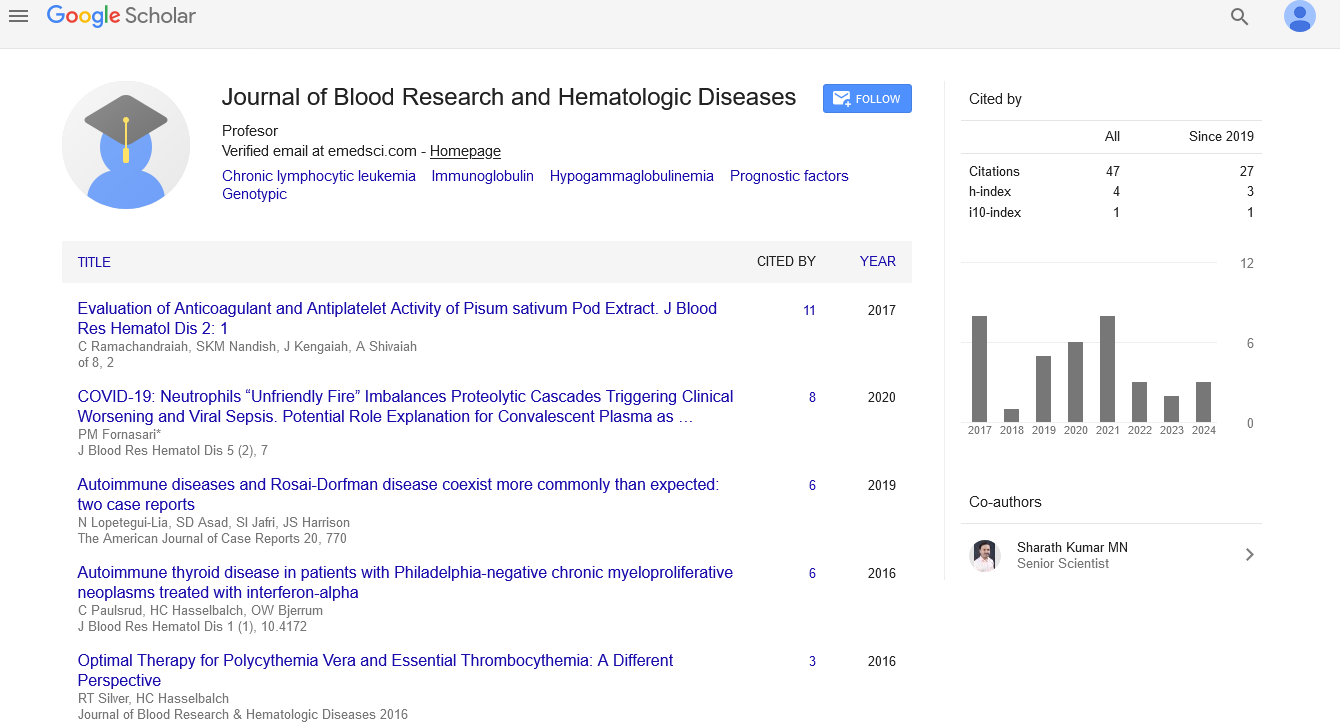Opinion Article, J Blood Res Hematol Dis Vol: 10 Issue: 1
Developmental Stages of Lymphocytes in the Lymphatic System
Krestiacy Saramson*
Department of Hematology, Erasmus University Medical Center, Rotterdam, The Netherlands
*Corresponding Author:Krestiacy Saramson
Department of Hematology, Erasmus University Medical Center, Rotterdam, The Netherlands
E-mail: krestiacysa@gmail.com
Received date: 24 May, 2024, Manuscript No. JBRHD-24-137143;
Editor assigned date: 27 May, 2024, PreQC No. JBRHD-24-137143(PQ);
Reviewed date: 11 June, 2024, QC No. JBRHD-24-137143;
Revised date: 10 March, 2025, Manuscript No. JBRHD-24-137143(R);
Published date: 17 March, 2025, DOI: 10.4172/jbrhd.1000218
Citation: Saramson K (2025) Developmental Stages of Lymphocytes in the Lymphatic System. J Blood Res Hematol Dis 10:1.
Introduction
Lymphocytes are a critical component of the immune system, responsible for recognizing and combating foreign pathogens and maintaining immune memory. Their development begins in the primary lymphoid organs, primarily the bone marrow and thymus, and continues through maturation stages in the secondary lymphoid organs, such as lymph nodes and spleen. In this article, we explore the intricate developmental stages of lymphocytes within the lymphatic system, highlighting their significance in immune function.
Introduction to lymphocytes and the lymphatic system
Lymphocytes are specialized white blood cells derived from Hematopoietic Stem Cells (HSCs) in the bone marrow. They play pivotal roles in adaptive immunity, which involves the recognition of specific antigens and the generation of targeted immune responses.
Description
The lymphatic system serves as the anatomical framework for lymphocyte development, providing a network of vessels, organs, and tissues that facilitate immune surveillance, antigen presentation, and immune response coordination.
Development of B lymphocytes (B cells)
B lymphocytes, or B cells, mature in the bone marrow. The developmental process involves several stages:
Hematopoietic Stem Cell (HSC) commitment: HSCs in the bone marrow commit to the lymphoid lineage under the influence of cytokines and growth factors, initiating lymphocyte development.
Progenitor stage: Progenitor B cells undergo rearrangement of immunoglobulin genes, a process known as V(D)J recombination. This genetic reshuffling generates diverse antigen receptor specificities crucial for recognizing a wide range of pathogens.
Immature B cell stage: Immature B cells express surface immunoglobulin (sIg) and migrate from the bone marrow to secondary lymphoid organs like the spleen and lymph nodes. Here, they undergo further maturation and antigen encounter.
Mature B cell stage: Upon encountering specific antigens, mature B cells differentiate into plasma cells or memory B cells. Plasma cells produce antibodies, while memory B cells provide long-term immunity by quickly recognizing and responding to previously encountered antigens.
Development of T lymphocytes (T cells)
T lymphocytes, or T cells, undergo development primarily in the thymus gland. The process involves distinct stages:
Thymic commitment: HSCs migrate to the thymus and differentiate into immature thymocytes under the influence of thymic stromal cells and cytokines.
Double-positive thymocytes: Thymocytes initially express both CD4 and CD8 coreceptor proteins (double-positive stage) and undergo positive and negative selection processes in the thymic cortex and medulla, respectively.
Single-positive thymocytes: Thymocytes that successfully undergo selection lose either CD4 or CD8 coreceptors and become singlepositive (CD4+ or CD8+) T cells.
Maturation and egress: Mature CD4+ helper T cells and CD8+ cytotoxic T cells migrate from the thymus to secondary lymphoid organs, where they interact with antigen-presenting cells and undergo further differentiation into effector or memory T cells upon antigen recognition.
Regulatory T cells (Tregs)
A specialized subset of T cells known as regulatory T cells (Tregs) develop in the thymus and play a crucial role in immune tolerance and regulation. Tregs are characterized by the expression of transcription factor FoxP3 and exert immunosuppressive functions to prevent autoimmune responses and maintain immune homeostasis.
Clinical relevance and implications
Understanding the developmental stages of lymphocytes is essential for diagnosing and treating immune-related disorders:
Immunodeficiency disorders: Defects in lymphocyte development can lead to primary immunodeficiency disorders, such as Severe Combined Immunodeficiency (SCID), where patients lack functional T and B cells.
Autoimmune diseases: Dysregulation of lymphocyte development and function can contribute to autoimmune diseases, including rheumatoid arthritis, multiple sclerosis, and type 1 diabetes, characterized by immune-mediated tissue damage.
Cancer immunotherapy: Exploiting the specificity and memory capabilities of T and B cells has revolutionized cancer treatment through immunotherapy approaches, such as checkpoint inhibitors and adoptive cell therapies.
Future directions in research
Ongoing research focuses on elucidating molecular mechanisms underlying lymphocyte development, enhancing understanding of immune cell interactions within tissues, and developing novel therapeutic strategies for immune disorders and cancer.
Conclusion
In conclusion, the developmental stages of lymphocytes within the lymphatic system are intricately regulated processes essential for immune function and health. From their origins in primary lymphoid organs to their maturation and deployment in secondary lymphoid tissues, lymphocytes play critical roles in immune surveillance, antigen recognition, and immune memory. Advancements in understanding lymphocyte development continue to drive innovations in immunology and therapeutic interventions, promising new avenues for treating immune-related diseases and improving patient outcomes.
 Spanish
Spanish  Chinese
Chinese  Russian
Russian  German
German  French
French  Japanese
Japanese  Portuguese
Portuguese  Hindi
Hindi 